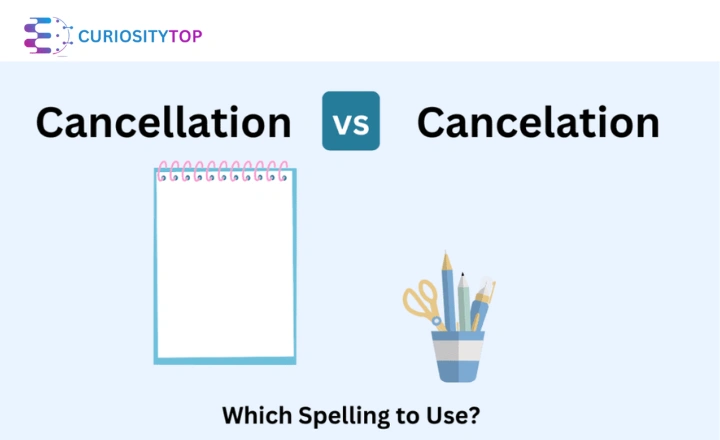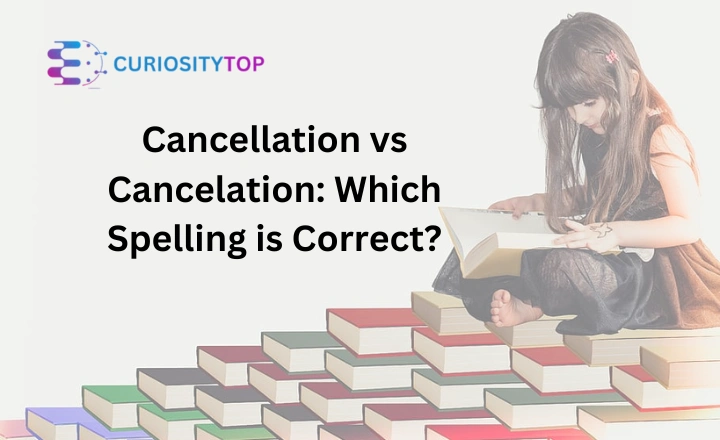Cancellation vs Cancelation: Which Spelling is Correct?
The difference between Cancellation vs Cancelation represents one of the most common spelling uncertainties in English. These variations often create confusion among writers, editors, and everyday communicators. While both forms exist, understanding their proper usage helps maintain clear and professional writing. The spelling cancellation has become the standard choice in most English-speaking countries, though regional differences persist in how people write this word.
Why is There Confusion?
The uncertainty around cancelled vs canceled stems from the natural evolution of language and regional spelling practices. As a living language, English often develops different spelling patterns across various regions and time periods. Many writers face this confusion daily when writing emails, documents, or social media posts. Both spellings in respected publications and digital platforms add to this uncertainty.
American and British English differ significantly in this confusion. Style guides often differ in their recommendations, and even spell-checkers sometimes accept both versions. This variation affects not just the word itself but also its various forms, including cancellation or cancelation. Writers often notice these differences when working with international colleagues or reading materials from English-speaking countries.
The rise of global communication has made this spelling difference more noticeable. People regularly encounter both versions in their daily reading, making it harder to consistently determine which form to use. Business documents, travel websites, and international correspondence frequently show both spellings, increasing uncertainty about the correct choice.
More read about Totalling or Totaling: Which Spelling to Use?
What Do “Cancellation” and “Cancelation” Mean?
Both cancellation vs cancelation share identical meanings despite their spelling differences. These words describe the action of terminating, ending, or invalidating something previously arranged or planned. Typical uses include stopping appointments, ending subscriptions, or calling off events.
The meaning remains constant regardless of whether you write canceled or cancelled. In business contexts, these terms often appear in policies about appointments, reservations, or service agreements. For example, airlines use these words in their booking policies, and subscription services include them in their terms and conditions.
The word applies to many situations, from formal contract terminations to simple schedule changes. When someone talks about cancelation, they refer to the same concept as someone using cancellation. This consistency in meaning helps maintain clear communication even when spelling varies.
Canceled or Cancelled? Canceler or Canceller? Canceling or Cancelling?
These variations follow similar patterns to the cancelation vs cancellation debate. American English typically uses single ‘l’ spellings: canceled, canceler, and canceling. British English prefers doubled letters: canceled, canceller, and canceling. Both forms correctly express the same ideas, but their usage depends largely on geographic location and writing style.
Professional writers often choose their spelling based on their audience’s location. Publishers, newspapers, and websites might stick to one form to maintain consistency. The choice between canceled versus cancelled matters most in formal writing, where consistency helps maintain a professional appearance.
Many style guides provide specific recommendations about which form to use. These guidelines help writers maintain consistency throughout their work. The key is to pick one form and use it consistently throughout a document or publication.
“Cancellation vs Cancelation”: Which Spelling Should You Use?

When choosing between these spellings, consider your audience and location. The spelling cancellation dominates most English-speaking countries and represents the safer choice for international communication. While cancelation appears in American English, it’s less common even there.
Style guides and professional organizations typically recommend using cancellation. This spelling works well for American and British audiences, making it the most versatile choice. Business communications, academic writing, and formal documents usually benefit from this more widely accepted form.
Even in casual writing, cancellation remains the more recognized spelling. It appears more frequently in digital communications, social media, and informal writing. This consistency helps readers focus on the message rather than questioning the spelling.
Why Do American and British English Differ in the Use of Single or Double “L”?
The history of these spelling differences traces back to early American English development. The famous American dictionary creator Noah Webster pushed for simplified spellings in the early 1800s. This effort created many of the spelling differences we see today between American and British English, including variations like canceled vs cancelled.
This spelling change wasn’t random but part of a larger movement to make American English more logical and straightforward. Webster believed simpler spellings would make learning easier and help establish a uniquely American identity. The pattern affects many words beyond cancelation or cancellation, including “traveled/travelled” and “labeled/labelled.”
| American English | British English |
|---|---|
| Traveling | Travelling |
| Modeling | Modelling |
| Marveling | Marvelling |
| Fueling | Fuelling |
| Labeling | Labelling |
| Quarreling | Quarrelling |
| Signaling | Signalling |
| Dialing | Dialling |
The rules for doubling consonants differ between American and British English. American English typically doubles the final consonant only when the stress falls on the last syllable. British English often doubles the final consonant regardless of stress patterns. This difference explains why we see variations in words like cancelled and canceled.
Synonyms of “Cancellation”
Many words can replace cancellation depending on the context and formality level. Here are the most commonly used alternatives:
- Annulment is a powerful legal term widely used in court proceedings and official documents when declaring contracts or agreements void. This term carries special weight in marriage dissolutions and legal proceedings where complete invalidation is necessary.
- Termination serves as a formal alternative, particularly prevalent in professional settings. Human resource departments often use this term in employment, while business contracts frequently include termination clauses that spell out specific conditions.
- Abolishment represents a permanent and official removal, typically used when discussing laws, systems, or institutions. Governments and organizations employ this term when permanently ending established practices or policies.
- Revocation appears frequently in legal and administrative contexts, specifically when dealing with licenses, permits, or official permissions. This term implies an authority figure taking back previously granted rights or privileges.
- Rescission provides a specific legal term for contract cancellations. Financial institutions and real estate agencies regularly use this term when parties need to void agreements or reverse transactions.
Examples in Context
Understanding how these terms work in real situations helps clarify their usage:
- Airlines face regular scheduling changes, leading to flight cancellations that affect thousands of travelers. Their cancellation policies must clearly outline passenger rights and compensation procedures.
- Educational institutions handle course cancelations when enrollment numbers fall below requirements. Students need to understand the cancellation process to adjust their academic plans accordingly.
- Entertainment venues deal with show cancellations due to various circumstances. Their ticket cancelation policies protect both the venue and customers from financial losses.
- Medical facilities manage appointment cancellations daily. They often implement strict canceled appointment policies to maintain efficient scheduling.
- Hotels and travel companies process reservation cancelations regularly. Their cancellation terms typically include specific timeframes and potential fees.
Origins of “Cancellation”
The etymology of cancellation reveals fascinating historical development:
- The 1530s marked the first recorded use of the term, derived from the Latin word “cancellare,” which meant creating lattice-like patterns.
- Medieval scribes used cross-hatched marks to invalidate text, leading to our modern understanding of crossing things out.
- Medical literature from the 15th century used the term when describing crossed visual patterns in the eyes, showing its versatile applications.
- The transition to modern usage evolved as society developed more complex scheduling and booking systems.
- Business practices in the 19th and 20th centuries helped standardize the spelling and usage of cancellation across various industries.
Conclusion
The distinction between cancellation and cancelation primarily reflects regional spelling preferences, with cancellation emerging as the globally accepted standard. This double-L spelling maintains consistency across formal documents, business communications, and everyday writing. While cancelation appears occasionally in American English, choosing cancellation ensures clear, professional communication that readers worldwide will understand and accept.
FAQs
What’s the difference between cancellation and cancelation?
“Cancellation” (double “l”) is the standard spelling globally, particularly in British English, while “cancelation” (single “l”) is an occasional American variant. The double “l” version is more widely accepted and recommended in formal writing.
Is it cancellation or cancelation in the US?
Both spellings are used in US English, but “cancellation” remains more common. While “cancelation” exists in American usage, central style guides and dictionaries typically prefer “cancellation” for consistency and clarity.
Why is cancelled spelled two ways?
The difference stems from spelling reforms in American English. Noah Webster’s initiatives simplified certain British spellings, leading to regional variations like “cancelled” (British) and “canceled” (American), though both are correct in their respective contexts.







